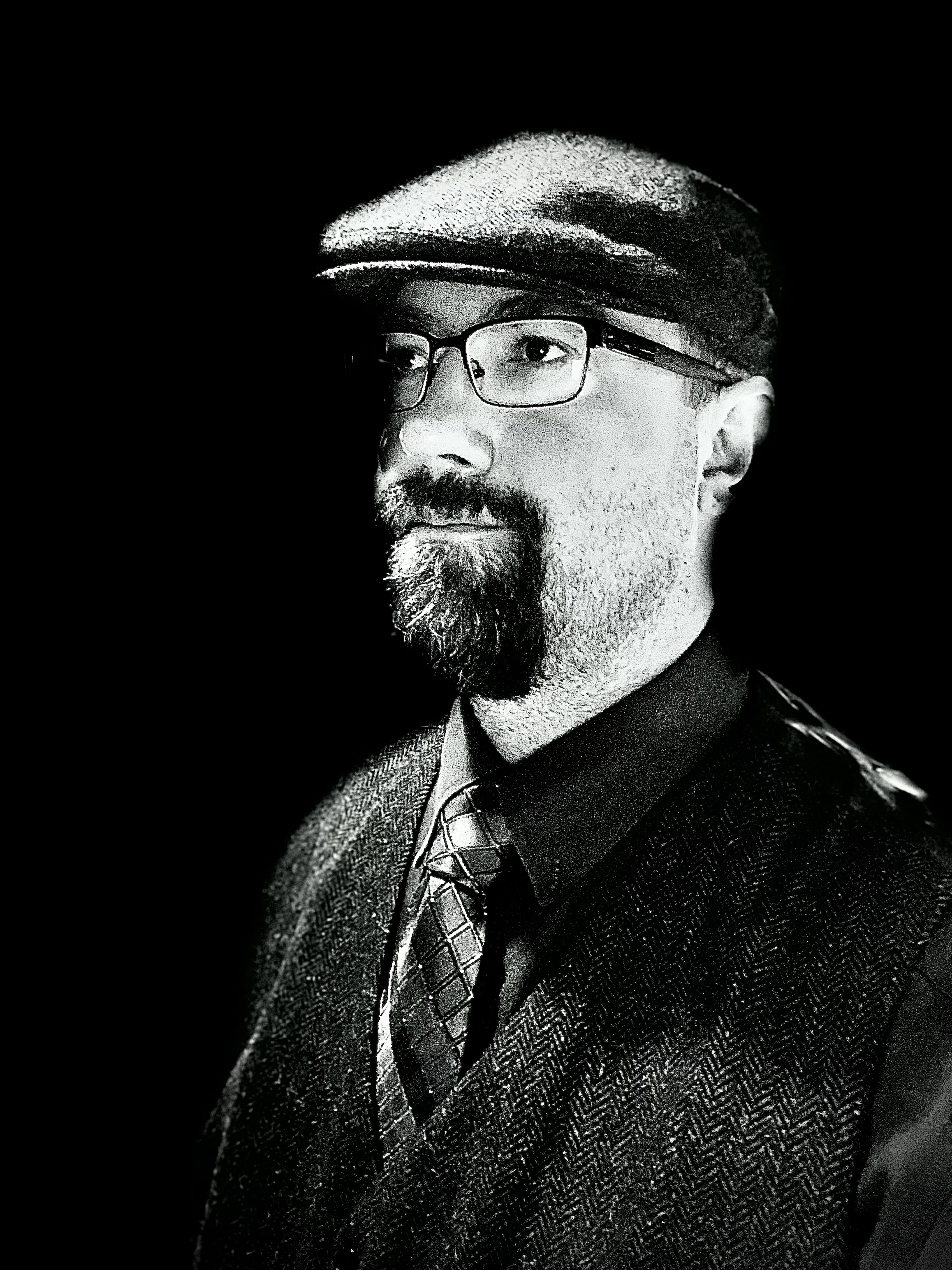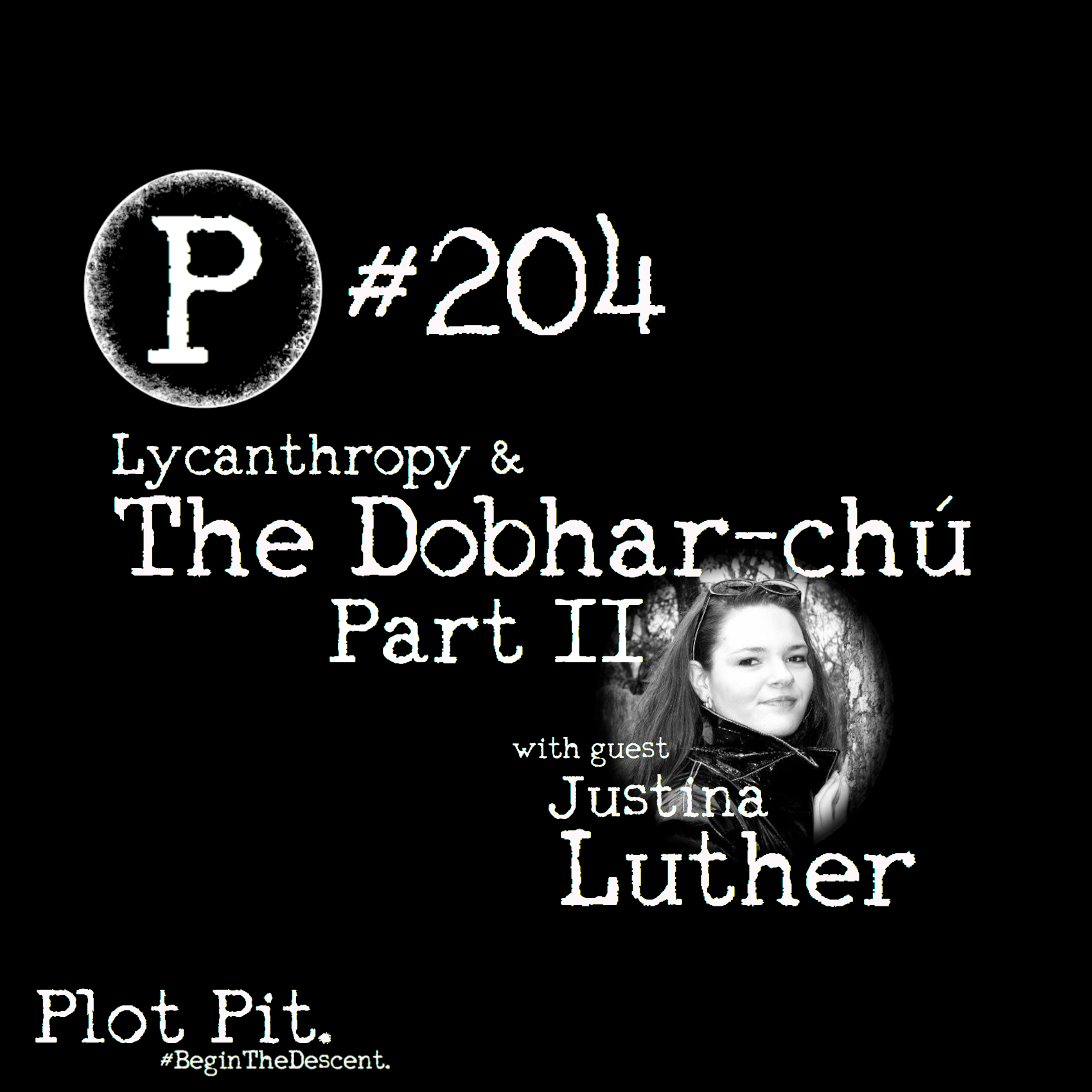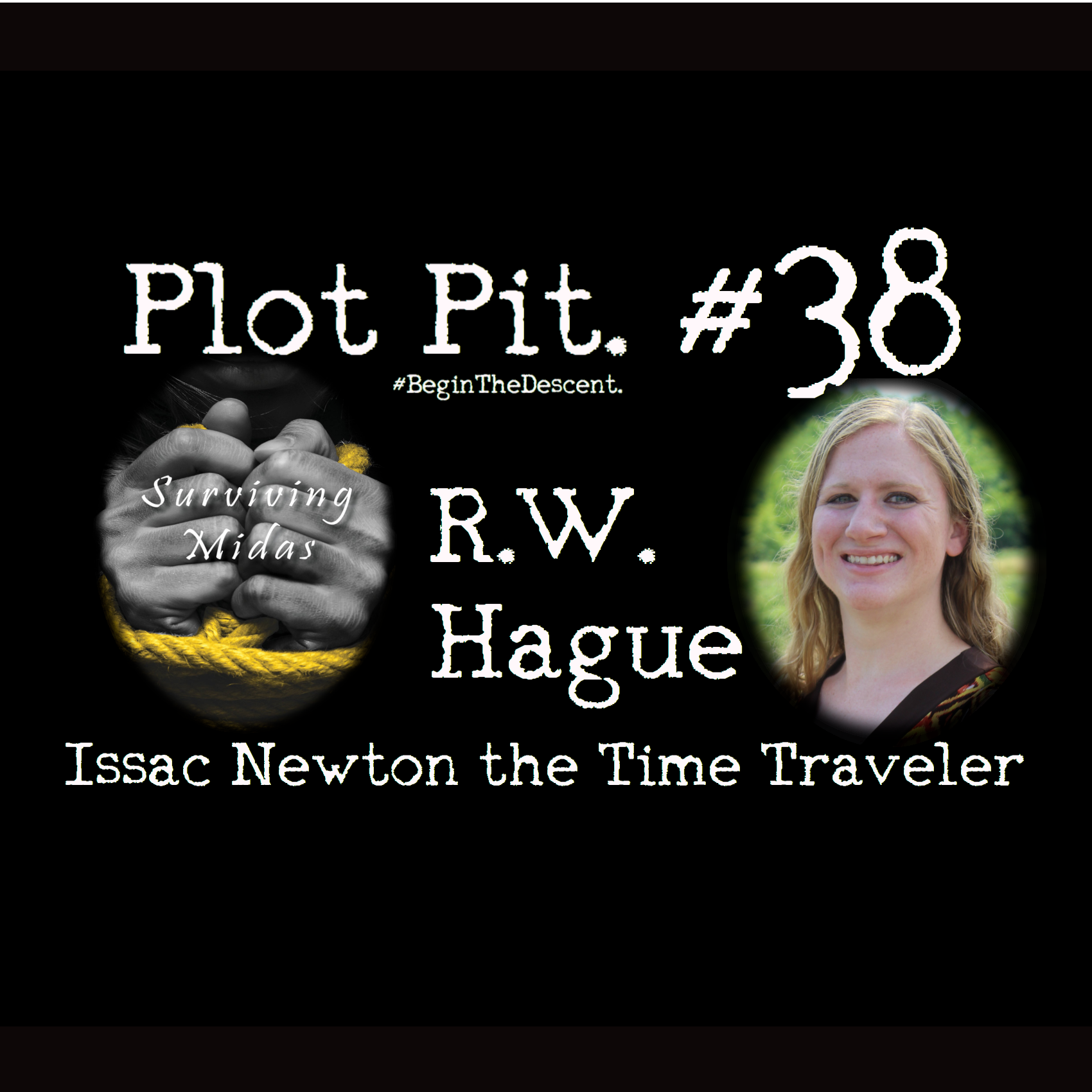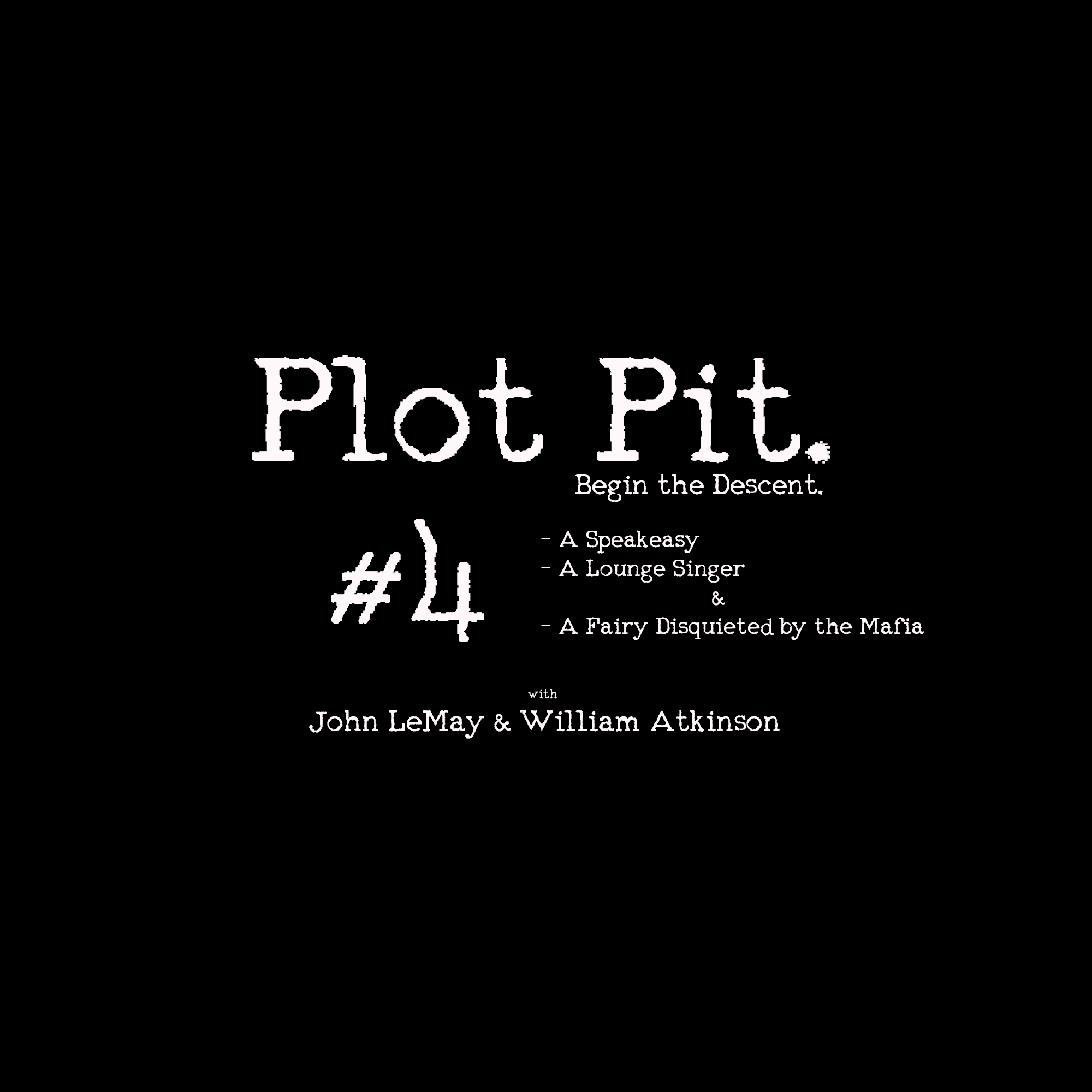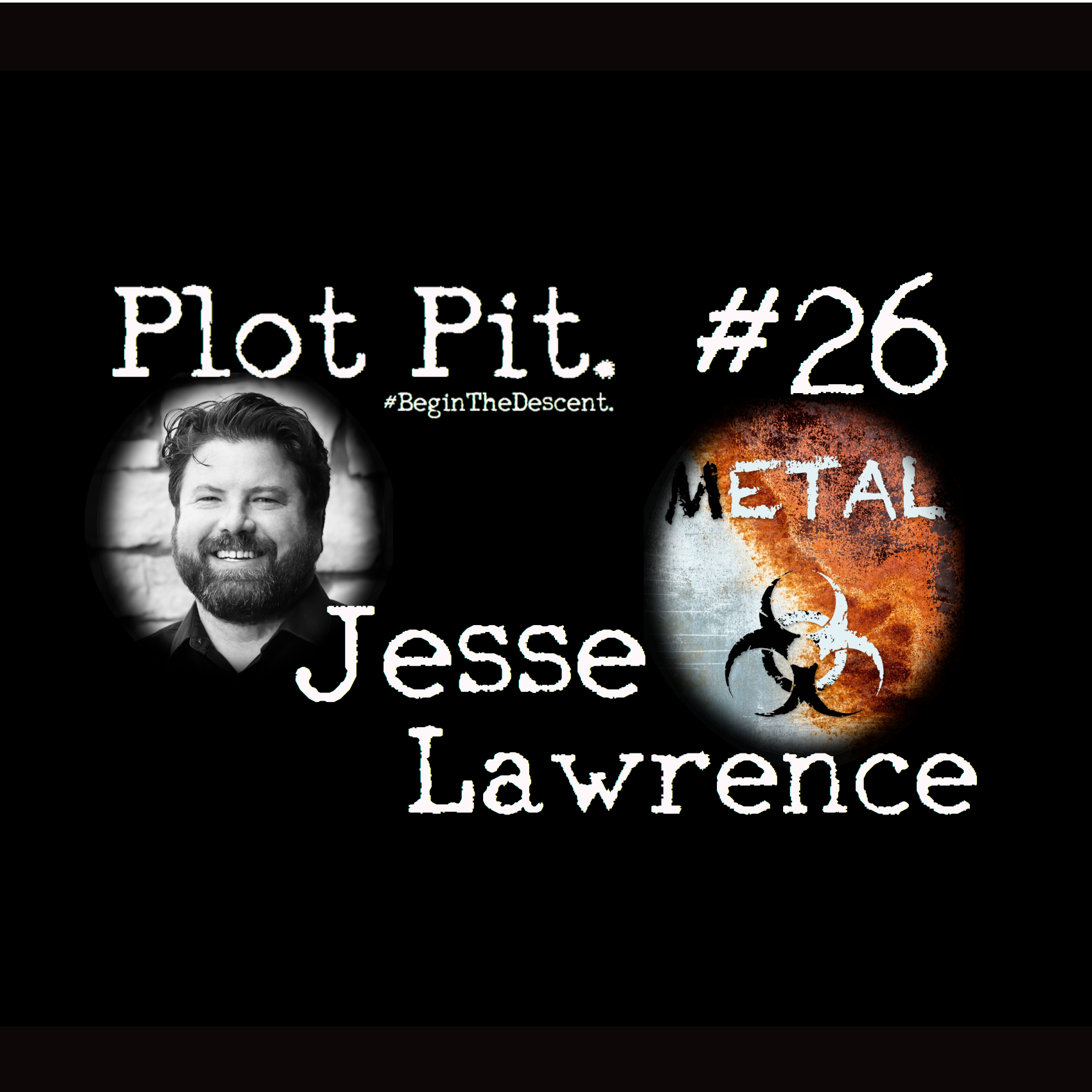Episode Transcript
[00:00:02] Speaker A: Welcome back to Plot Pit, season two, episode four. William Atkinson here in studio with John LeVay. And we have Justina Luther on the phone to complete a Two Porter. Two Porter? Yeah, two Porter, a two parter, which we just started on Thursday last week. Justina, welcome back. It's good to have you.
[00:00:21] Speaker B: Hey, glad to be back. I think you were thinking about the bar with the order.
[00:00:25] Speaker A: It's very possible, yes. So, folks, if you have not caught that episode, you'll want to catch it. It's actually a pretty good one. We're going to continue with a sequel to it on today's episode. In the meantime, before we get into that, Justina, tell us a little bit about yourself for anybody new listening.
[00:00:41] Speaker B: I am a multi genre author. I write fantasy, romance, horror, Sci-Fi, suspense thriller, young adult and new adult. My book, BioLife, was a medical thriller, Sci-Fi. I'm all over the place, and I have fun doing it.
[00:00:59] Speaker A: And it actually topped BioLife, specifically, one of the subgenres for Amazon's bestseller list, if I recall correctly.
[00:01:08] Speaker B: Yes, it did.
[00:01:09] Speaker A: All right, excellent. I have an email question for you.
Yeah, I got two of them. So this one is from John out of New York, of all places. And John was asking specifically, quote, you've recently got a copy of Scrivener. I'm interested in potentially getting that versus another program called Ulysses. Do you like scrivener?
[00:01:34] Speaker B: I really love working with Scrivener. Now, as with all products, there are certain areas where I think it can be improved, specifically when it comes to the editing of books. But overall, I love the control that Scrivener gives you in breaking down scenes, in keeping character notes, and keeping scene descriptions and all of these things. You can keep everything that I used basically across, like, ten different apps in one place at your fingertips. So all you have to do is click over, like, oh, wait, how old was this character? Oh, what did they look like? Click over to their description. Oh, okay. Got it. Back to the scene. Moving on. So I really do like it. There are so many different ways that it gives you control over the writing process and the different mechanics of it and the way you need to work with your brain rather than trying to force your brain to work around a given system.
[00:02:31] Speaker A: For our listeners out there, this is not a paid promotion by Scrivener at all. I do enjoy Scrivener myself really well. And we got Justina a copy of the software because of her support for the writing community over on what is now X, but formerly known as Twitter. So there you go. That's the little history behind all of that. In the meantime, what we have here is the second part of a two parter with Justina Luther, where we've taken on this concept of Lycanthropy with the Dobri Chu or the Ware otter out of Ireland. So, John, why don't you take us in with a previously on Plot Pit sure.
[00:03:09] Speaker C: So the Dobri Chu is a potentially true story, or maybe some folklore with some truth to it from Ireland about this gigantic otter like creature that lives in the water and allegedly killed a woman named Grace Connolly in 1722. That was our real jumping off point. And the monster was actually etched onto her tombstone, which we thought was cool. So the story we came up with, we don't really stick exactly to the facts. You got to mold it in accordance to the story.
[00:03:38] Speaker A: Yes. We call that artistic license.
[00:03:40] Speaker C: Yes. So instead of 1722, we basically pictured this incident with the woman allegedly being murdered by this otter monster to have taken place probably in the late 18 hundreds. And the twist in our story is that she was actually a weree otter herself and that her husband was actually a supernatural hunter who hunted down kind of like a vampire hunter or werewolf hunter who killed supernatural creatures who had unknowingly married this woman that was herself a were otter, the dobertu.
And they have a son together who is therefore also half of a wartter dobertu, whatever you want to call it. And the father, after he kills the mother in her animal form, he moves them to America to get away from it, he goes to New York. And so we envisioned our story picking up in the 1920s with the son.
I think the father has by now passed away. The son is now a young man. And he always thought his father was crazy because his father would mutter know, killing the Dober Chu. And then the father would grieve the know. And the young know thinks know he killed the Dober Chu to save the mother, when in fact the mother was the Dober Chu. So our story, we envision him going back to Ireland, back to his roots, kind of like in John Wayne's The Quiet Man. So our main setting is Ireland in the 1920s when he's uncovering all these skeletons in the closet of his family. And to prove whether or not the story that his father told was true, he exhumes his mother's grave and sees her bones. And Justina had the idea that his mother's spirit would come back for the night and then he would converse with his mother. But the downside to that was it also revives the evil Dobertu Otter King. And that was kind of our lead into the sequel that he would have to deal with this king otter monster.
[00:05:37] Speaker A: So let's begin the descent into the sequel. And Justina, you mentioned coming off of the first part of this, that you had an idea where to take it.
[00:05:46] Speaker B: So one thing that I was thinking about was in our brainstorming for the first one dagger was mentioned, correct?
[00:05:55] Speaker C: Yeah, I forgot to throw that in. Yeah, yeah.
[00:05:57] Speaker A: So we had the two MacGuffins, we had the tombstone and the dagger. Yeah.
[00:06:01] Speaker C: And the dagger was a real part of the story, too. It's just for readers who like this or listeners who like that sort of thing.
[00:06:06] Speaker B: So what if the dagger was buried with the mother? And because of the dagger being in the coffin with her when she's raised, it actually becomes kind of magically imbued itself? There's a part of the Dobertu legend that talks about protective fur. So what if, through being with her, when she is revived, that dagger becomes the one thing that can kill the Otter King and it's also the dagger that his father used to kill his mother?
[00:06:36] Speaker C: Yeah, that's perfect, because we got to have rules to this mythology. And that is such a perfect connection that the Dobertu has, like you said, the impenetrable fur and then the dagger can do. I so we've been talking about this hero, though, who's half Dobertu, half human. So what do you think, Justina? Should he have skin that's impenetrable?
Should he have superpowers?
[00:07:01] Speaker B: Basically, I think more so than superpowers. It might be he's on the extreme side of what a human is capable of, perhaps a little bit more so because he's not straight. Dover, too. He is watered down, so to speak, because his father was although he was a hunter, he was still fully human.
[00:07:22] Speaker A: Yeah. So what we took was the idea that he was a boxer in the underground of New York. And the way I'm thinking about that, to really put this into perspective, is say he has not really a 6th sense, but he has the ability to anticipate and strategize of one on one combat. And that's why he was so successful in the Ring. And of course, he's also super strong, so it's not like he's invincible or anything. But he might be a little quicker and stronger than the average human. Right.
[00:07:57] Speaker B: Which then puts him perhaps he heals a bit faster. So he's stronger, he's faster, he thinks a little bit. He's more acute in his senses when it comes to any type of battle. But you put a book in front of this man and he may not be the brightest.
[00:08:12] Speaker A: So before we go too much further into this, just as a kind of a let's extract ourselves out of the story for just a second. John, you mentioned you have to have rules for mythology and stuff that you're building in a book. Can you give us a one and a half minute ish commentary on exactly what you mean there and why?
[00:08:30] Speaker C: Yeah, the rules just give you something to aim for in the story, just like how there's rules to how the Force works. In Star Wars, for instance, and Lord of the Rings, they have all their rules. It just gives you things that gives you parameters to play within, because it's kind of like any game wouldn't be fun if there were no stakes to it. So I guess the rules give you stakes.
Well, like vampire stakes, through the heart, things like that.
[00:08:58] Speaker A: I suppose that's a great analogy. Ultimately, I think what you're getting at here is, one, it's a means to anchor fantasy into believability to where you don't have to suspend your disbelief too terribly much. And two, it raises the stakes for the hero to going into these conflicts as a way of putting the hero in peril. Because if there is no peril, there's no tension. If there's no tension, there's no resolve. If there's no resolve, then there's no fun.
[00:09:28] Speaker B: Yeah, exactly. I saw a message on Twitter once, and someone said, does it bother you when you see reality and fantasy? And I said, no, because the more reality you put into a fantasy book, the more you're allowed to throw into the book. That's completely bigger than life and crazy, because if you have the reality to anchor the book, there are no limits to how crazy you can get.
[00:09:53] Speaker A: I actually think that the rules then going off of what you just said, it does allow you to have a bit of contrast between the highs and the lows to go into that roller coaster. Okay, so going back into our story, we've got this dagger that is imbued with supernatural power or magical energy that can penetrate this protective fur to destroy this evil otter King or the lycanthrope otter. We have our hero, who is kind of an underground boxer that's a little quicker, a little stronger. He's not really superhuman, but he's not like a normal guy either. And he has the ability to potentially heal himself a little better in the event that he is injured. Take it away, Justina.
[00:10:39] Speaker B: What if his mother having the power that she was? So let's say she wasn't the strongest one in the pack. She was supposed to marry the leader, so maybe she was the next strongest. Maybe she was the strongest of the female line. So while she doesn't have the power to stay with her son personally, she can give him a final gift after that 24 hours. And not only does she give him the gift of the dagger, but she also perhaps gives him a gift to sense when the King is coming, so that he's never completely caught off guard. He can tell when the King's coming, but he doesn't realize right away what it is that makes the hair stand up on the back of his neck. He doesn't realize necessarily what he's running from because, like we said, the guy's not necessarily the sharpest tool in the box. He's going to get there, but it's going to take him just a little.
[00:11:34] Speaker C: He so is he kind of like Thor as an otter? As an otter man?
Kind of a Thor type character?
[00:11:43] Speaker A: Yep.
[00:11:44] Speaker B: With maybe hulk's temper.
[00:11:46] Speaker C: Yeah.
[00:11:46] Speaker A: John. You had mentioned Thor. Right. And when I think of Thor, I've got the hammer and all of that, but he's also got wild hair. So this guy is a were, right?
[00:11:58] Speaker C: Yeah.
[00:11:58] Speaker A: Our hero. The story with a species of Lycanthropy that have protective fur. So we could add the physical attribute that this guy is just insanely furry. Yeah, right.
[00:12:11] Speaker B: That's what I was thinking, but I wasn't going to say it.
[00:12:14] Speaker A: So maybe he has to shave like, three or four times a day, and this could be where, say, his weakness is. Right. So kind of taken a little bit off of the Samson concept from the biblical tales, right. Where if he is shaved too much, he loses some of his ability to heal or his speed or something of that nature. So going back to the rules of the mythology, right? If he loses his hair, the hair is part of what's imbuing him with these traits from the Lycanthropy. Right. And so if he loses that, he loses those traits, and it takes a while for it to regenerate.
[00:12:52] Speaker B: And what if his that was like the last comment from his mother, but he didn't completely hear what she was saying or something. So the reader kind of knows what she's talking about, but doesn't get the entire message, and he's trying to figure out her final message and he gets it just before the big battle at the end of book two or whatever.
[00:13:10] Speaker A: Okay, so taking to that, a thought just pops into my head, pulling a little bit off of the idea of Dr. Jekyll and Mr. Hyde. You know, he is a rather intelligent, bright fellow, but the more the hair grows, the more animal comes into him, bringing his intellect over into and so.
[00:13:30] Speaker B: We'Re talking like Bruce Banner versus the Hulk type.
[00:13:33] Speaker A: Yeah, yeah, kind of.
[00:13:35] Speaker C: Okay, that's I like that. I actually think we need to lighten the story up because I think we're getting into some crazy, crazy territory. So maybe a light hearted comic book route is maybe more the route to go. So I'm liking that.
[00:13:48] Speaker A: Yeah.
And this would potentially help impact, say, his ability to pay attention to what his mother is saying, because if you have a dog, specifically certain breeds of dogs, they have that tendency to get distracted very quickly. And for any of those who are listening, I'm thinking of up in the puppy, right?
[00:14:12] Speaker B: Squirrel.
[00:14:13] Speaker A: Right.
If he hasn't shaved in three or four days, because he's doing whatever's necessary, all the research and everything, he's excited to see his mom. DA DA DA DA DA. Hasn't shaved in a while now he's got more beasts than man, and so he's not really paying attention so much to what she's trying to communicate with him, and so a lot of it goes right over his head.
[00:14:36] Speaker B: Yeah, I know. And now all I can picture is, like, this giant golden retriever type man who's so excited to see his mom.
[00:14:46] Speaker A: All right, John, we've got the idea that you suggested of taking this rather heavy handed story with fantasy that we've got into the comic book realm. Or we could back off the throttle a little bit, bring it back into a little bit more reality, and still base it into kind of the 1950s monsters movie that's set in, say, 1920s Ireland. So what do we want to do?
[00:15:07] Speaker B: But here's the thing. You need the balance of both. That's what makes a really good story, are those full throttle scenes that have no mercy, that push you to the edge, and then you get a scene afterwards that gives you a little breathing room to contemplate what on earth just happened. So I think it's more rather than going one or the other, you need both.
[00:15:30] Speaker C: Yeah. And I had a thought of another layer to add to the story and how to make the father more of a special figure. So somewhere in the back of my mind, it clicked that Ireland had its own monster hunter hero, and his name was Finn McCool.
Have we done him before?
[00:15:46] Speaker A: No, we have not. But it got brought up when we had Declan finn Cool on the program. Yeah.
[00:15:51] Speaker C: I just think that's such an awesome name, finn McCool. But he was a folkloric Irish monster hero or not monster. He was an Irish hunter monster hunter hero. So I thought maybe that could be the father's lineage. And that's why he's such a special why this character is so special is he's the son of the greatest monster hunter and a were otter. So maybe that's another reason why he's.
[00:16:17] Speaker B: And not only that, but that, to me, brings another interesting layer to the mother, because the whole reason the father was who he was was being the monster hunter. But then he also loved his wife more than anything. And to find out that she was one of those things and he killed her yeah. That's going to destroy him.
[00:16:37] Speaker A: Yeah. I like this.
[00:16:40] Speaker B: That, to me, almost makes me want to make him like, the focal point character of the first book and then have the son be like, the focal point of book two.
I mean, there's so much juicy with that character. My goodness.
[00:16:53] Speaker C: There's a lot we could pull from Lon Chaney Jr's. The Wolf Man, which is big on the relationship between the father and the son and the son who returns to the ancestral home. And then also the omen with Gregory Peck where he adopts the child that turns out to be a monster, and he's, like, researching its history. Because last episode, when we were talking about the son digging up the mother's grave, I kept seeing Gregory Peck digging up the grave of his adopted son's mother, and it turns out to be a jackal. And it's a really good, creepy scene. So, I mean, we could tone the story down. We've kind of turned it into a superhero movie where there's a hero and a villain. There's a part of me that would almost just like to do a more simple story about a man who finds out that he's an old Irish ware otter when he returns to his ancestral home and just kind of rip off. Not rip off, but the Omen and the wolf man are very similar in that the father has to kill the son at the end of the movie. So I don't know, I think there's potential for that. And that would be the more grounded option. Then the comic book route would be the more outlandish. He turns into a giant hulk otter and has to fight.
[00:18:03] Speaker A: All right.
[00:18:04] Speaker B: I think it's more fun when it's more grounded in reality and you're forced to look at the human interaction and the emotion of what his father went through and what he's going through and realizing what he is on both sides of his family.
[00:18:22] Speaker C: Yeah. And that's another thing I like in terms of subtext, is it would work from the perspective of skeletons in the closet that his father died. So he goes back to his ancestral homeland and he learns of this huge skeleton in the closet, which is that his mother was a monster, and then the skeleton in the closet could be made literal when he digs up the grave and finds the skeleton of a monster where his mom's supposed to be buried. I kind of like that as an analogy.
[00:18:50] Speaker A: Now I want to just toss a little bit of comic flair on that and say, it's not a coffin, it's an actual wardrobe that she was buried in. So that way she's literally a skeleton in a closet. Okay. Yeah.
[00:19:05] Speaker B: I like it.
I still think I like the idea of his fur, so to speak, his otter pelt being what gives him that side of his lineages strength.
[00:19:23] Speaker C: Yeah.
[00:19:24] Speaker B: And it does make him a little bit dumber. But we don't have to go the full on golden retriever bouncy. Happy to see his mom aspect, but I do think a certain amount of that makes more sense because his strength then also becomes his weakness, because yes, that makes him stronger in order to fight this creature that's coming after him, but it also makes him dumber. So can this creature outsmart him? Which side of his lineage does he need to go with in order to beat this thing?
[00:19:55] Speaker C: Well, yeah, and Finn McCool is supposed to be super wise, supposedly.
[00:19:59] Speaker B: So which side of his family does.
[00:20:01] Speaker A: He lean into that adds balance to the human question versus animal question, nature versus nurture, kind of instinct versus learning. I do like that. That's a pretty cool commentary. That could be done. All right, folks, we are approaching the end of our episode. We've been on the phone with Justina Luther here, finishing up a two parter from which we started on Thursday last week. Justina, this has been a blast. Thank you for being on the show again.
[00:20:28] Speaker B: Thank you for having me back. I always love coming for fun.
[00:20:31] Speaker A: Yeah, that's what we do here at this desk is have fun. All right. So with that said, we've been talking about lycanthropy and werewolves and were otters specifically for this two parter episode. And the dobra chew out of Ireland. Well, our previous guest, Adrian Lopez, has a new book coming out on Halloween, lycan Bloodlines. And here's the blurb on the back of the book. Kaden lives his high profile law career to head home when his uncle unexpectedly passes away. He quickly learns the town holds dark secrets and discovers some of his own as well. Learning of his newfound strengths as well as his weaknesses, he must discover his true identity and understand why he was never welcomed back home. During his stay, he becomes familiarized with his new abilities and vulnerabilities. On this journey, he learns of a family he never knew he was a part of and must decide if they even want him to be one of them. And this struggle leads to a moment where he must decide to join the bloodline he never knew he had or to completely eradicate it forever.
And John, you were asking Adrian last week if he had a book cover, and we've talked a little bit about how important book covers are in the artwork. Right. Well, here it is. Tell us what you think.
[00:21:50] Speaker C: Oh, very cool. I love this. I'm not faking this. This is actually fantastic.
I really tore into cheap CGI looking covers on the show. And this looks like a comic book cover.
It's not very computery to me. It looks to me like a human did this. I love it. It's got three wolves, kind of a red moon. It's all basically the color scheme is black, gray and red. I love it. It's beautiful.
[00:22:16] Speaker A: It is. It's really cool. And so this will come out Halloween. So I will have a link in the description of the podcast below. You can pre order this on Amazon. Author is Adrian Lopez, if you are interested. He had two episodes on season two bookending, the start of three episode appearances at the end of season one. So you can catch five episodes with him in sequence, if you are interested. So there you go, Adrian. Good work on the art cover. And this is going to be a fantastic story. And you know, I'm not a big fan of the vampire mythology, as you know, John, but I do enjoy the undead stories like skeletons and mummies and zombies and stuff. And I also like werewolves for some. And, you know, going into Halloween, we have a whole spook theme coming up for Plot Pit, starting not next week, but the week after.
All right, well, we've been on the phone here in studio. Well, excuse me, we've been in studio, John and I. And then on the phone we've had Justina Luther, author of bestselling medical thriller BioLife. And then, of course, what might be considered as a quasi companion story to what we've just generated here on Plot Pit, and that is Whiskey Haze. Justina, it's been a pleasure having you on the program.
[00:23:31] Speaker B: Well, thank you so much for having me back. It's always an absolute blast to join the Pit.
[00:23:37] Speaker A: And you have been working on some new work. Do we have a publishing date by any chance of something to expect from you soon?
[00:23:44] Speaker B: We don't yet.
With caregivergiver life and everything like that, I'm just kind of trying to take it one day at a time. I'm hoping to have the first draft of BioLife sequel done soon. It's been a lot of stops and starts just trying to find a new normal after the crazy, crazy publishing year that I had in 2022. So finding the new normal, that is absolutely understandable.
[00:24:11] Speaker A: And you mentioned you're kind of going back to the love of writing, which, as John, I think you would agree, if you can find that passion and tap into it, you're writing far better.
All right, well, folks, we've been here in studio, John and I, with Justina Luther on the phone. I will have links to her socials and everything down below, but Justina, give us those on the way out.
[00:24:32] Speaker B: You can find me on Instagram, Facebook, TikTok, Twitter, all the places either author Justina Luther or Justina Luther.
[00:24:40] Speaker A: Excellent. So a little bit of admin and housework. We are revitalizing the visuals of the studio for our video, which we will be hopefully done within a week or two. And you can catch us on Discord. There will be a link to the Discord server below where you can interact with myself or John or Justina, even Adrian, any one of the guests that we've had on the program from season two forward. And we are also set up to accept donations. If you want to support the program, you can either visit our webpage, Plot Pit.com and donate there, or find us on patreon links again, also in the description, follow us on Twitter, instagram. We are on TikTok now, Justina, I'm not sure if you saw that.
[00:25:24] Speaker B: Did not. I'll have to go check that out.
[00:25:27] Speaker A: And Facebook, john is managing our Facebook group and profile out there. So outside of that, John, I think that's about it.
[00:25:34] Speaker C: Yeah, I think so.
[00:25:35] Speaker A: And in the meantime, goodbye from Roswell.
